What Is Obesity?
Obesity means having too much body fat. It raises your risk for many health problems like heart disease, diabetes, and sleep apnea. Doctors use ICD-10 code E66.9 for obesity when no specific cause is found. In simple terms, obesity means weighing more than is healthy for your height. In the U.S., about 1 in 3 adults is affected, according to the CDC.
Common Causes and Risk Factors
- Family history or genetics
- Eating high-calorie, low-nutrient foods
- Lack of physical activity
- Hormone problems (like thyroid or insulin issues)
- Certain medications
- Stress and poor sleep
Signs and Symptoms
- BMI of 30 or higher
- Waist size over 40? for men or 35? for women
- Belly fat that's hard to lose
- Getting tired doing everyday tasks
- Low energy or joint pain
How Dr. Rishi Chadha Diagnoses Obesity
Dr. Chadha uses a step-by-step approach:
1. Comprehensive Health History & Exam
Review of your medical and family history, lifestyle factors, medications, and a focused physical exam to identify contributing risks.
2. Anthropometric Measurements
Precise measurement of BMI, waist circumference, and total body weight to classify obesity severity (Class 1-3).
3. Screening for Related Conditions
- Blood pressure check for hypertension
- Diabetes or prediabetes assessment
- Sleep apnea evaluation
4. Laboratory & Imaging Tests
Blood panels to evaluate metabolic and hormone profiles (thyroid, insulin, lipids) and imaging if needed.
5. ICD-10 Coding & Care Planning
Accurate use of codes (e.g., E66.9) for insurance and a personalized treatment roadmap integrating lifestyle, medication, or procedural options.
Frequently Asked Questions
What causes obesity?
A mix of diet, low activity, and genetics.
What is Class 3 obesity?
A BMI of 40 or higher, or 100+ pounds over ideal weight.
What is the ICD-10 code for obesity?
E66.9 is used for general obesity. Other codes exist for related conditions.
Can obesity be reversed?
Yes. With the right plan, many patients lose weight and feel better.
Are there non-surgical options?
Yes. We offer lifestyle coaching, medication, and endoscopic procedures.
How soon will I see results?
Most patients notice changes within a few weeks. Full results may take months.
Does insurance cover obesity care?
It depends on your plan. Our team helps you check your benefits and obtain any pre-authorizations.
Is treatment safe?
Yes. Dr. Chadha follows science-based, safe care plans tailored to each patient.
Are follow-ups required?
Yes. Regular check-ins keep you on track and allow adjustments for optimal progress.
How do I start?
Call our Houston office to schedule your first visit with Dr. Rishi Chadha.











